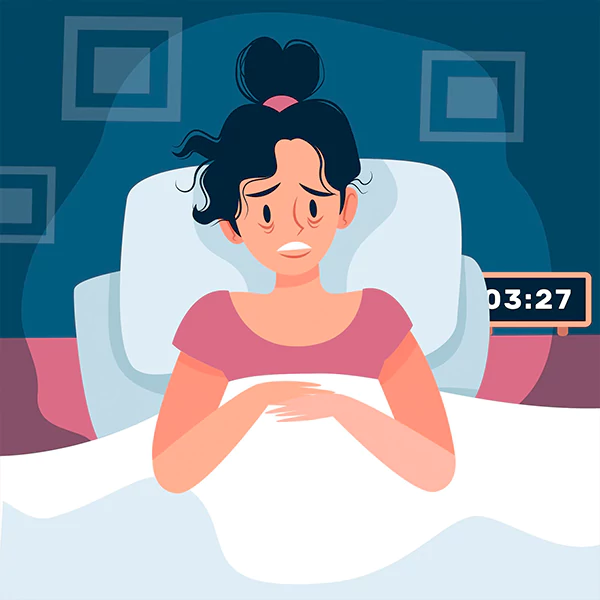Sleep apnea is a sleep disorder in which breathing is interrupted, characterized by stopping and starting again regularly during sleep. It happens when the muscles at the back of the throat fail to keep the airway open, resulting in apneas, or brief pauses in breathing. Sleep apnea can have a profound effect on our physical health, can cause high blood pressure, heart disease and stroke condition. These apneas can occur several times each hour and extend from a few seconds to minutes. Because of the absence of oxygen during these apneas, you may experience short awakenings throughout the night, resulting in poor sleep quality and increased daytime drowsiness. Other health problems, such as high blood pressure, heart disease, and stroke, can be exacerbated by sleep apnea. Obstructive sleep apnea (OSA), central sleep apnea (CSA), and complex sleep apnea syndrome (CSAS) are the three kinds of sleep apnea. The most frequent variety is OSA, which happens when the airway becomes clogged or restricted during sleeping, whereas CSA occurs when the brain fails to transmit correct signals to the muscles that govern breathing. CSAS is an abbreviation for OSA and CSA. In order to have a better night’s sleep, one can go for treatment or can follow some other tips to have an uninterrupted sleep.
The Link Between Sleep Apnea and Depression
Depression is characterized by constant feelings of hopelessness, sadness, worthlessness and suicidal thoughts. Around 17% of adults will experience depression at some point in their lifetime. People who have sleep apnea are at a higher risk to develop depression. Some studies have proven that people with sleep apnea experience depression five times more likely than those without sleep apnea. This can be due to many factors:

1. Sleep Disruption
Sleep apnea causes regular interruptions in sleep, which results in poor sleep quality and eventually an excessive daytime sleepiness. Therefore, sleep disruption is a common risk factor for development of depression, as it can effect mood and cognitive functions.
2. Hypoxia
Sleep apnea results in intermittent episodes of hypoxia, that is characterized by lack of oxygen in the body. Hypoxia is elated to increased inflammation in the body, that can contribute to the development of depression.
3. Neurotransmitter imbalances
Sleep apnea alters the levels of neurotransmitters such as serotonin and dopamine, which regulates mood. Imbalance in the levels of these neurotransmitters can contribute to the development of depression.
4. Stress
Sleep apnea can cause stress, it can impact quality of life and alters the daily functioning of an individual. Chronic stress is a common cause of development of depression.

5. Obesity
Obesity is a major risk factor for depression and sleep. As obesity can cause hormonal changes, inflammation and other physiological changes, that led to both of the conditions.
The Link Between Sleep Apnea and Anxiety
Anxiety is characterized by feeling of worry, fear and uneasiness that can vary from mild to severe, and can be accompanied by other physical symptoms like sweating, rapid heartbeat and trembling. Anxiety is a common reaction to stress, but the excessive and persistent anxiety that interferes with daily life, is classified as an anxiety disorder. There are many types of anxiety disorders, including panic disorder, generalized anxiety disorder, social anxiety disorder and certain specific phobias. Anxiety disorder can be treated by pharmacological therapy or non pharmacological therapy, based on the stage of disorder, that varies from patient to patient.
Around 31% of adults will experience an anxiety disorder at some point in their lifetime. Sleep apnea is related to the development of anxiety. Many studies have proven that people with sleep apnea are up to 4 times more likely to feel anxiety than those without sleep apnea. There are many factors that contribute to this:
- Sleep disruption
- Stress
- Hormonal imbalance
- Hypoxia
- Fatigue
The Effects of Treating Sleep Apnea on Mental Health
Treatment of sleep apnea can leave a positive effect on mental health. Many studies have shown that treating sleep apnea with continuous positive airway pressure (CPAP) therapy can cause an improvement in the symptoms of depression and anxiety disorders.
What is CPAP Therapy?
CPAP therapy involves wearing a mask over your nose or mouth during sleep, that facilitates a continuous flow of air to keep the airway open. This therapy prevents the interruptions in breathing that occurs in sleep apnea and allows uninterrupted and restful sleep. CPAP therapy improves sleep quality and reduce fatigue, in this way, it helps to reduce and prevent the symptoms of depression and anxiety in people with sleep apnea.
According to the American Sleep Apnea Association, CPAP therapy has a success rate of 80% approximately, when it is used properly and most importantly, consistently. This proves that the majority of people who use CPAP therapy experience a good improvement in their sleep apnea symptoms.
It is a point to be considered, that effectiveness of this therapy can vary, according to the severity of the condition, adherence to their treatment and other factors such as lifestyle and weight. For some patients, this therapy can be life changing treatment that can improve the quality of their sleep and fight sleep apnea.
The Bottom Line
In conclusion, the link between sleep apnea and mental health is clear. Sleep apnea can increase the risk of developing depression and anxiety, and can exacerbate symptoms in those who already suffer from these conditions. However, the good news is that treating sleep apnea with CPAP therapy can improve mental health outcomes. If you suspect that you or a loved one may have sleep apnea, it is important to seek medical advice and treatment.

